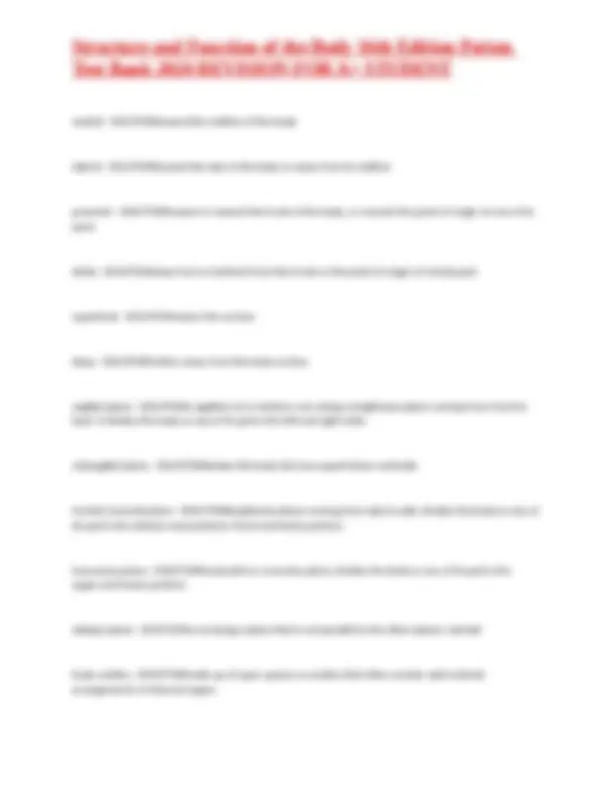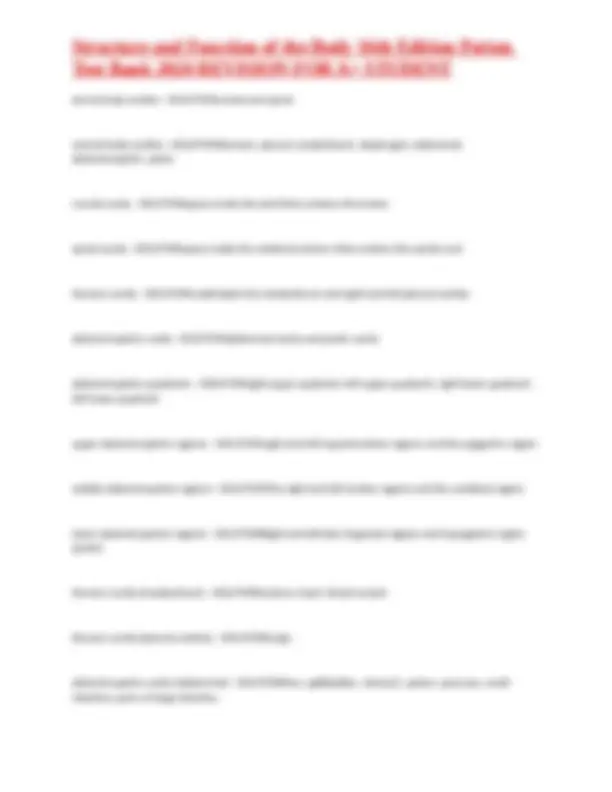






Study with the several resources on Docsity

Earn points by helping other students or get them with a premium plan


Prepare for your exams
Study with the several resources on Docsity

Earn points to download
Earn points by helping other students or get them with a premium plan
Community
Ask the community for help and clear up your study doubts
Discover the best universities in your country according to Docsity users
Free resources
Download our free guides on studying techniques, anxiety management strategies, and thesis advice from Docsity tutors
Structure and Function of the Body 16th Edition Patton Test Bank 2024 REVISION FOR A+ STUDENTStructure and Function of the Body 16th Edition Patton Test Bank 2024 REVISION FOR A+ STUDENT
Typology: Exams
1 / 8

This page cannot be seen from the preview
Don't miss anything!





anatomy - SOLUTIONthe study of an organism and the relationships of its parts; derived from two word parts that mean "cutting apart"; dissection dissection - SOLUTIONprocess of cutting the human body apart for learning physiology - SOLUTIONthe study of the functions of living organisms and their parts scientific method - SOLUTIONsystematic approach to discovery; 1) propose hypothesis - idea or principle to be tested 2) experimentation - series of tests of a hypothesis (a controlled experiment eliminates biases or outside influences) 3) theory or law - a hypothesis that has been supported by experiments and thus shown to have a high degree of confidence experimental controls - SOLUTIONused to ensure that the test situation is not affecting the results test group - SOLUTIONThe experimental group that is exposed to the variable in an experiment. control group - SOLUTIONthe group that does not receive the experimental treatment. theory or law - SOLUTIONa hypothesis that has gained a high level of confidence levels of organization - SOLUTIONchemical level , organelle level, cellular level, tissue level, organ level, organ system level, organism level chemical level - SOLUTIONatoms and molecules cells - SOLUTIONsmallest "living" units of structure and function; organizations of various chemicals tissues - SOLUTIONan organization of many cells that act together to perform a common function
organs - SOLUTIONa group of several different kinds of tissues arranged in ways that allow them to act as a unit to perform a special function systems - SOLUTIONan organization of varying numbers and kinds of organs that can work together to perform complex functions for the body organism - SOLUTIONorganization of all systems together, forming a whole body microbiome - SOLUTIONset of interacting communities of bacteria and other microorganisms that inhabit the human body; influences normal body funtion structure fits function - SOLUTIONanatomical parts have structures exactly suited to perform specific functions anatomical position - SOLUTIONTo stand erect with arms at the sides and palms of the hands turned forward; head also points forward, as do the feet, which are aligned at the toe and set slightly apart bilateral symmetry - SOLUTIONthe left and right sides of the body roughly mirror each other supine - SOLUTIONbody is lying face upward prone - SOLUTIONbody is lying face downward superior - SOLUTIONtoward the head; upper, above inferior - SOLUTIONtoward the feet; lower, below anterior - SOLUTIONfront; in front of; ventral posterior - SOLUTIONback; in back of; dorsal
dorsal body cavities - SOLUTIONcranial and spinal ventral body cavities - SOLUTIONthoracic, pleural, mediastinum, diaphragm, abdominal, abdominopelvic, pelvic cranial cavity - SOLUTIONspace inside the skull that contains the braine spinal cavity - SOLUTIONspace inside the vertebral column that contains the spinal cord thoracic cavity - SOLUTIONsubdivided into mediastinum and right and left pleural cavities abdominopelvic cavity - SOLUTIONabdominal cavity and pelvic cavity abdominopelvic quadrants - SOLUTIONright upper quadrant, left upper quadrant, right lower quadrant, left lower quadrant upper abdominopelvic regions - SOLUTIONright and left hypochondriac regions and the epigastric region middle abdominopelvic regions - SOLUTIONThe right and left lumbar regions and the umbilical region. lower abdominopelvic regions - SOLUTIONRight and left iliac (inguinal) regions and hypogastric region (pubic) thoracic cavity (mediastinum) - SOLUTIONtrachea, heart, blood vessels thoracic cavity (pleural cavities) - SOLUTIONlungs abdominopelvic cavity (abdominal) - SOLUTIONliver, gallbladder, stomach, spleen, pancreas, small intestine, parts of large intestine
abdominopelvic cavity (pelvic) - SOLUTIONlower (sigmoid) colon, rectum, urinary bladder, reproductive organs abdominal region - SOLUTIONanterior torso below diaphragm antebrachial region - SOLUTIONforearm axillary region - SOLUTIONarmpit brachial region - SOLUTIONarm buccal region - SOLUTIONcheek carpal region - SOLUTIONwrist cephalic region - SOLUTIONhead cervical region - SOLUTIONneck cranial region - SOLUTIONhead crural region - SOLUTIONleg cubital - SOLUTIONelbow cutaneous region - SOLUTIONskin or body surface
palmar region - SOLUTIONpalm of hand pedal region - SOLUTIONfoot pelvic region - SOLUTIONlower portion of torso perineal region - SOLUTIONArea (perineum) between anus and genitals plantar region - SOLUTIONsole of foot popliteal region - SOLUTIONarea behind the knee supraclavical region - SOLUTIONarea above the clavicle tarsal region - SOLUTIONankle temporal region - SOLUTIONside of skull thoracic region - SOLUTIONchest umbilical region - SOLUTIONarea around navel or umbilicus volar region - SOLUTIONpalm or sole zygomatic region - SOLUTIONupper cheek axial - SOLUTIONhead, neck, torso
appendicular - SOLUTIONupper and lower extremities homeostasis - SOLUTIONrelative constancy of the internal environment; maintaining relatively constant conditions within the body feedback loop - SOLUTIONhighly complex and integrated communication control system negative feedback loop - SOLUTIONoppose or negate a change in a controlled condition positive feedback loop - SOLUTIONa feedback loop in which change in a system is amplified